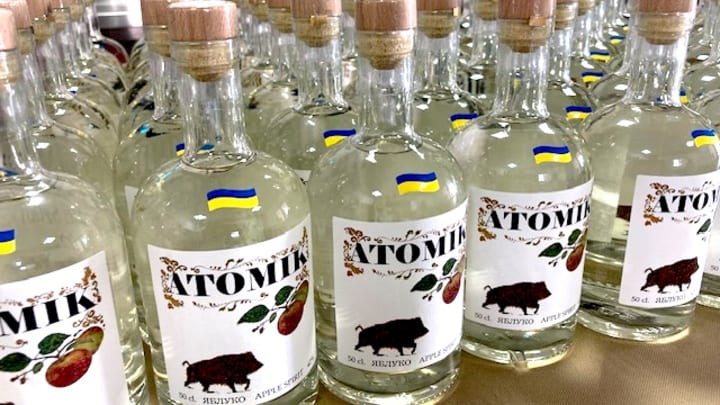If you’re looking for something unique to put in your holiday punch, it doesn’t get more singular than this. A distiller has just released ATOMIK, a grain spirit similar to vodka, made from crops grown in the Chernobyl Exclusion Zone—and it’s safe to drink, further showing how flora and fauna have recovered in the largely unpopulated area since the worst nuclear accident in history.
On April 26, 1986, a nuclear meltdown and twin explosions blew the lid off one of the Chernobyl Nuclear Power Plant’s reactors. Radioactive fuel and debris were blown into the air over northern Ukraine, covering the immediate area and spreading radioactive material across Europe [PDF]. The explosion scattered 400 times more radioactive material than the dropping of the atomic bomb over Hiroshima, and over 200,000 people had to be evacuated from the area. They were ushered onto buses and forced to leave behind their homes, most of their belongings, and even their pets. To prevent more radiation leaks, the nuclear plant was ensconced in a concrete “sarcophagus.”
In the almost 40 years since the disaster, though, the Chernobyl Exclusion Zone—a 30-kilometer (18.6-mile) radius around the nuclear plant that is off-limits for human habitation—has fared surprisingly well. Plants and animals continue to thrive, and in some cases are doing better than they were when humans were around. And the region’s eerie, abandoned reputation has attracted curious visitors. In 2019 alone, more than 125,000 tourists flocked to Chernobyl for a “glimpse of the apocalypse.”
But not everyone has given up on the exclusion zone’s potential.
Jim Smith, the co-founder of the Chernobyl Spirit Company, is a professor at the University of Portsmouth in the UK who has studied the Chernobyl disaster and its aftereffects for more than 30 years. His goal in starting the company and producing ATOMIK vodka was to show that the spirits could still be safely made from a land many people view as irreversibly contaminated. The social enterprise company supports the area’s recovery by donating over half of their profits so far—a total of over £30,000.
“We’re certainly the only drinks company making spirits from Chernobyl, and probably the only one whose directors aren’t taking any salary or dividends,” Smith said in a statement.

As for the question on most drinkers’ minds—‘is the stuff radioactive?’—all of the Chernobyl Spirit Company’s drinks, including their apple spirit and pear and plum schnapps, have been scientifically tested to prove they’re safe to drink. Studies showed that the Chernobyl-grown rye used for the vodka had radiostrontium levels slightly above the conservative Ukrainian limit, but that once it was distilled, no Chernobyl-related radioactivity could be detected. And though the alcohol is diluted with water also from Chernobyl, that water comes from a deep underground aquifer 10 kilometers (6.2 miles) south of the power plant. It has a similar chemistry to water in limestone aquifers in England and France.
The company remains staunch in its belief in the power of both nature and the Ukrainian people. Every bottle they sell features a wild boar, frequently seen in the exclusion zone, on the label as a symbol of the “resilience of nature,” the company writes on its website, “but also the long and difficult road to recovery of the Chernobyl-affected people in the face of too many simplistic and often wrong assumptions about their environment.”
The batches currently for sale are the first produced since Russia invaded Ukraine in February 2022. Smith describes the war as having had a “much worse” impact on Ukraine than the Chernobyl incident, and the company intends to donate at least 75 percent of their profits to supporting the recovery of Ukrainian communities. The Naodychi district is one such community: This semi-inhabited area west of Chernobyl is where the company sources its fruits, and when the high school’s windows were destroyed by a Russian missile, the Chernobyl Spirit Company donated to its renovation.
Such efforts are only made more poignant by the fact that, in August, the company’s director was called to the front lines. “With all the horrors going on in Ukraine and elsewhere, it sometimes seems that our efforts with ATOMIK spirits don’t make much difference, but they do,” says director Kyrylo Korychensky, who is also a geologist and radiochemist at the Ukrainian Hydrometeorological Institute. “They make people’s lives a little bit better.”
ATOMIK spirits make a great conversation starter at your next cocktail party—but they’re also a testament to Ukraine’s endurance.
